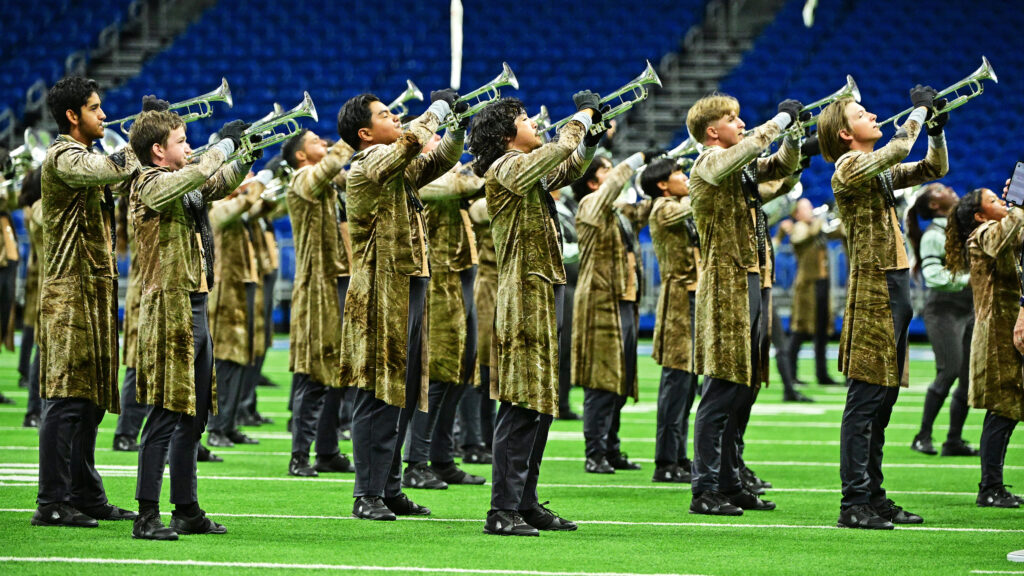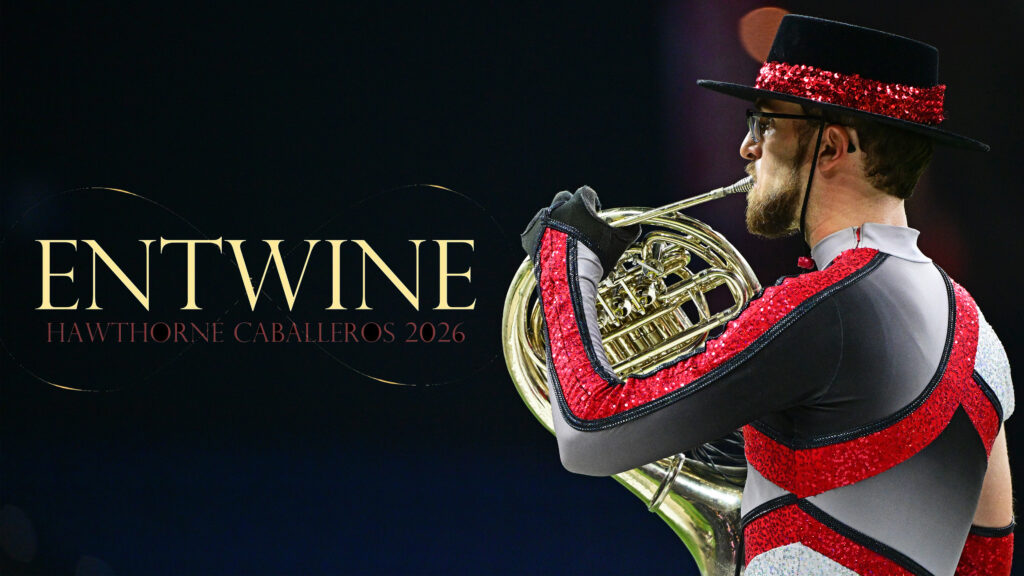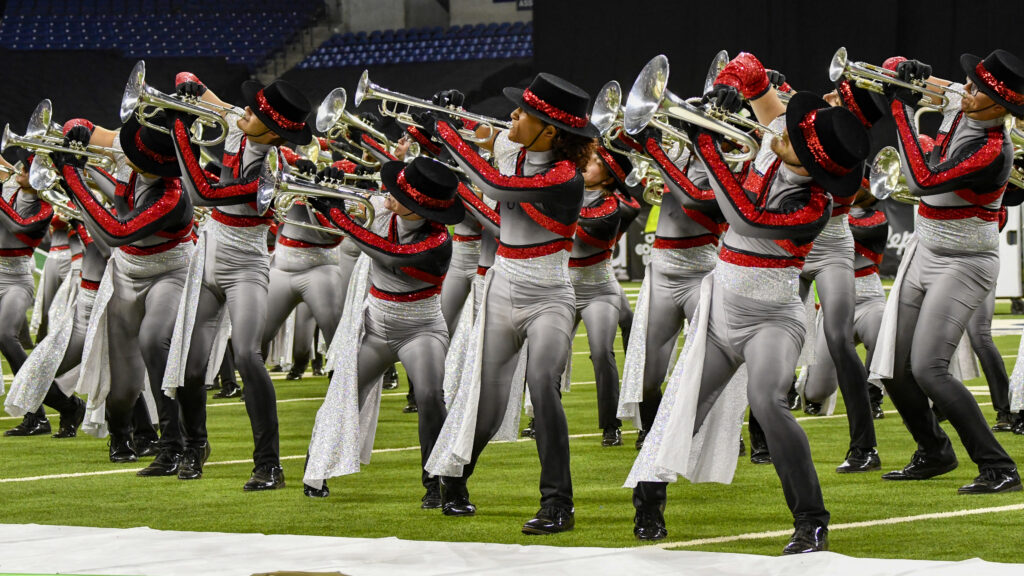I started my drum corps career in the Cavalier Cadets colorguard in the late 1970s. We didn’t do much back then, aside from some front spins and right side drops. But as the years progressed, I joined other members from the horn line and drum line to march in the feeder corps winter guards. Those few indoor seasons provided a great break from school during the cold Chicago months. And although I still occasionally wake up in a cold sweat after nightmares of doing Danny Terrio-inspired dance moves in front of fan-filled bleachers while Bill Chase music blares in the background, my winter guard experience was enough to help me gain an appreciation for the activity.
By the time I marched in the Cavaliers, my marching peers and I were show-attending winter guard aficionados. WGI was a ritual for us. Each year, we’d pile in our cars, borrow CBs from our fathers, make up stupid “handles” and head out on I-90. We’d usually end up getting threatened a few times by truckers who’d tell us to get off their frequency, but for the most part, our overnight rides would end up in Dayton safely at dawn. We’d arrive too early to check into our hotel, and would meet up with our friends from other parts of the country for our traditional breakfast at Perkins. We’d sleep 10 to a room, borrow money from the guys who had some, and, for the most part, would spend the weekend acting like idiots. Back before high schools and drum lines ruled the WGI turf, we’d show up early for open class prelims on Saturday in full Hawaiian garb, complete with a ukulele or two and leis to pass out to the crowd. We’d sit in a block, where we perfected the slow-mo standing ovation, engaged in impromptu sing-alongs and did things that must have come off as incredibly annoying, offensive and arrogant to others but seemed downright hilarious to us. Back at the hotel, we’d stay up all night, trying to find or avoid trouble. The weekends went by without incident, save for a broken leg, an occasional visit from hotel security and plenty of Sunday morning headaches. It was everything we loved about drum corps — only without those annoying rehearsals and shows. It was a great way to get the recognition from your corps name without having to put in any of the work. We basked in the glow of the great winter guards the Cavaliers produced. It was fun being on the outside looking in. Little did I know that one year, I’d be on the inside looking out. My experiences in the WGI crowd and in the cadet winter guard may have prepared me for my four-month stint in the Cavaliers winter guard, which took place in 1988, but I’m not really sure how. But there was Steve Brubaker, asking for local horn players and drummers after the December camp in late 1987, telling us he had written a part for us in the upcoming winter guard show. Ten of us agreed, collectively holding about as much coordination and talent as one regular member of the guard, as long as that member had a 104-degree fever, an ingrown toenail on each foot and a severe case of blurred vision. Which may explain why Brubaker’s plan was for us to hide behind large black panels for half the show. But more on that later. The short season was an absolute blast. Sure, we weren’t the 1982 Jets or 1983 James Bond portrayers, but our short-lived opportunity at a high-profile gig brought with it new opportunities to expand horizons not often associated with baritone and euphonium players: I.e. meet more girls. That year, the winter guard used “Mars” from “The Planets” by Gustav Holst as the music for its show. Forgoing the standard classical versions, this “Mars” was performed by Kitaro, who seems to have been the pre-cursor to Yanni, new-age John Tesh and those various performers who rely on electronic keyboards, mountainous backdrops and wildly gesturing right arms to get their musical message across. I would imagine a Kitaro concert — similar to 1977 Pink Floyd and 1993 Star of Indiana — is best enjoyed when you’re using a mind-altering substance. Anyway, Brubaker had written spots for 10 enslaved members of some futuristic society whose other inhabitants fought an unseen oppressor for their freedom using rifles, sabers, flags, multicolored streamers and excessive hair mousse. The guard staff had big plans for our “prisons” that included PVC pipes, arm holes, lycra and other elements of an underground Jane Fonda workout tape, but we were instead stuck with 10 versions of the initial prototype: Rectangular box with black canvas stretched across three sides, allowing members to stand in back. Several taped silver stripes ran up and down the front of the panel, further illustrating the point that we were in prison. Basically, we hid in and moved around big black boxes with silver metallic stripes on them. Think misguided dominoes for prehistoric animals. We stood “trapped” for the first 200 counts of the show, forced to accept Kitaro’s brilliance as we counted off his various blips, blops and scratches during “Mars” while awaiting our cue. Then we picked up our panels — we called ourselves “panelists,” get it? — did some serious moving without the benefit of seeing where we were going, and finally were able to emerge after we’d been “freed.” This was the tough part. We held chains and actually had to do some sort of dance, which was about as minimal as you would expect, but was still sort of a cross between a UCLA male cheerleading routine and someone ducking to get out of the way of an oncoming shot-put. When I finally saw the tape of WGI a few years later, I noticed that I slightly tripped over my chains after I’d been freed. I felt stupid about it at first, but later realized that it was more than likely that someone trapped in a large domino for about four minutes while listening to a Moog synthesizer demo would have little control over his legs and would likely do the same. It should have been written into the show. Since we only took part in a portion of the performance, we didn’t always have much to do during rehearsal. That’s how we perfected the art of soundless football, four-square, baseball and—our piece de resistance—soundless basketball, where we’d pass the ball off to each other without ever dribbling, paying unknown homage to those Indiana grade-school coaches who insist on all five players touching the ball before someone takes a shot. Despite our part-time rehearsal schedule, someone felt that it would be a good idea if we participated in the guard’s final moment at WGI finals. After seemingly completing our show, we’d leave the floor at the back corner, run down a hallway and re-enter on the opposite side, this time carrying large shiny red flags on bouncy poles, which as every follower of the Star Wars epic knows, signifies total victory. We rehearsed the re-entry many times at our Ohio practice site and had it down to near-perfection on the morning of finals. Only problem, of course, was that the hallway at the arena was about 50 feet shorter than the one at our rehearsal site, meaning we ran back onto the floor with plenty of time to spare. Not to worry, we were warned about this ahead of time and told to “improvise” if we got back onto the floor too early. Of course, to a seasoned member of the guard, “improvise” means something entirely different than it does to a few horn players and a couple of drummers. I managed to avoid the improvisational feat called “stand and stare at crowd,” opting instead for my 1978 standby — the right side drop. OK, maybe I threw in a left-side drop or two for kicks, but when I hit my set about 15 counts too early, it was time for a little free-form guard work and I was all too happy to oblige. Maybe a bit too much. I missed the first count of the real flag work we were supposed to do, as a passed-around photo at the April camp later that month — one showing 20-something guys with their flags on the ground, one moron with his flag still up — illustrated all too well. But my embarrassment was short-lived. After all, I had a silver medal, the experience of marching in a WGI finals competition and the memory of thousands of girls clamoring for my autograph. I mean hundreds. OK, nine or 10. Maybe less. The next year, we were back to our road-trip antics again, rightfully sitting in the stands in our Hawaiian shirts for what would be our final group trip to WGI. No one asked for my autograph that year, although I did sign a credit card bill handed to me by an obviously smitten Holiday Inn employee for our hotel room when we checked out.
Marco Buscaglia marched in the Cavalier organization from 1978-1989. He is the editorial director for a division of Tribune Media Services in Chicago. He can be reached at [email protected].





